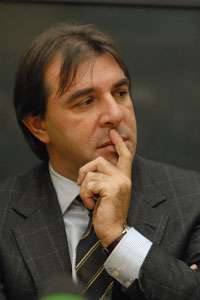|
Back
Day of Wrath Zurich
Tonhalle
07/09/2011 -
Giuseppe Verdi: Messa da Requiem
Fiorenza Cedolins (soprano), Marie-Nicole Lemieux (mezzo-soprano), Stuart Skelton (tenor), Matti Salminen (bass)
Chor der Oper Zürich, Zusatzchor des Opernhauses Zürich, SoprAlti der Oper Zürich, Ernst Raffelsberger (chorus master), Orchester der Oper Zürich, Daniele Gatti (conductor)

D. Gatti(© A.T. Schäfer)
Almost – but for a Parsifal at the Opera – bringing the Zurich Festspiele (Festival) to an end, the Zurich Opera Orchestra under Daniele Gatti brought Verdi’s Requiem to the stage of the Tonhalle. Gatti is currently Music Director at Zurich Opera in a two-year interregnum between Franz Welser-Möst and Fabio Luisi.
Gatti’s soprano Fiorenza Cedolins, a very late replacement for Barbara Frittoli, was the only Italian among the soloists and this paid off with clearest diction in the final Libera me. However in earlier sections Cedolins (a specialist in Puccini and Verdi operas) had a constant and off-putting vibrato, though she had no difficulty with steely volume and the top notes. Australian tenor Stuart Skelton was thrilling in full voice, but lacking in his head-voice for the quiet and high-lying sections.
Matti Salminen is a fine stalwart bass, gained special recognition this year from the Zurich Festival committee by being awarded a Lifetime Achievement Award for his services to opera, but now in his sixties the voice is losing its timbre and richness. What his voice lacked was – almost – compensated by facial gesture and arm movements. He looked the part, a benevolent God.
Of the soloists, the most impressive was Marie-Nicole Lemieux who gave a flawless reading of the mezzo/alto part with a big, if not particularly characterful, voice in all registers. The soloists blended well, an achievement as the tenor was not the one originally scheduled and the soprano was such a late replacement – the programmes had already been printed with Frittoli’s name.
Daniele Gatti kept a watchful eye throughout and was sensitive to his singers and helpful to the chorus. He did not allow tempi to drag and ploughed a steady but rather uninspiring course. This wasn’t a spontaneous performance but in the Dies Irae it was suitably majestic and earth-shattering. It was an interpretation of extremes, beginning very softly (which taxed the chorus until they settled) and exploding into the louder sections. The Orchestra sounded excellent, pleased to be out of the pit, and followed Gatti’s direction precisely. The Chorus, numbers swollen to well over 100 by aggregating the three opera choirs, were excellent and sang loudly and lustily whenever required: perhaps they were not quite subtle enough in the quieter sections. In the loud sections, they frequently drowned out the orchestra, particularly the woodwind.
This was not a slow, deeply religious performance à la Giulini. But nor was it a fire and brimstone performance à la Toscanini. It was a fairly standard reading, with operatic overtones. The audience went out, after the Day of Wrath, to a suitably humid summer evening of thunder, lightning and a torrential downpour.
John Rhodes
|